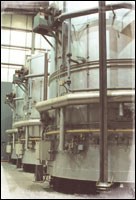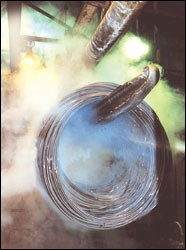Bolting Together a Good Cleaning System
Nucor Corporation's Fastener Division needed clean steel in order to make first quality bolts, nuts and screws. It found what it was looking for in this zinc phosphating system...
Colossal giants of concrete and steel are quiet most days, but put a hometown football, baseball or hockey team in one of them, and the sleeping giants wake up. Noisy fans search for seats, purchase refreshments and cheer on the team. They gawk at the athletic feats, laugh at the mascot and boo the umpires and referees. But, how many of them look up to see the girders, joists and bolts holding the arena together?
The Fastener Division of Nucor Corporation is concerned with this. The company makes the bolts you see in many stadiums, such as the new stadiums in Pittsburgh, Cincinnati and Astros' Stadium in Houston. And, of course, making the bolts is crucial, but so is preparing the steel rod prior to making the bolts. If the coil is not properly prepared, the high-speed cold formers will not be able to properly manufacture the bolts.
Nucor does things right. So when it decided to install three new hydrogen bell annealing furnaces from Ebner Furnaces, it looked in to purchasing new shot blasters to replace the ones it had been using to clean the steel rod. "We had to obtain new air permits, so we decided now was the time to look into the installation of a pickle line," commented Jay Miller, annealing and pickle house supervisor. "We looked into new shot blasters, but decided that shot blasting was a messy process. Also, maintenance of the shot blasters was very expensive.
Nucor also explored the possibility of having an outside company clean the coiled rod for them but decided that it was not cost effective. Instead, it decided to invest in its own line and learn the process. "We didn't know what we were getting into when we put the line together, but we have learned a tremendous amount since it's been in," noted Mr. Miller. "Our original pickling time was probably 30 to 45 minutes per coil. Now we are down to 10 minutes."
How did Nucor accomplish this? Prior to annealing, the 5,000 lb coils are pickled. The coils were then heated in the annealing ovens, but Nucor found that it was getting scale on the parts. "We were running the furnaces a little too warm," explained Mr. Miller. "If you pull steel under 300F, it should, in theory, form no scale. So we changed our annealing cycles and end times." This cut the pickling process to 10 min.
Other improvements to the line include recirculation pumps on the acid tanks that provide up to 8 tank turnovers per hour. This has shaved approximately 5% off of the pickling time and improved the quality of the wire. "Another change we made recently that saved 20% on our dip time in the zinc phosphate was a change to Nalco as our zinc phosphate supplier," stated Mr. Miller. "We have been able to keep our iron levels down by controlling our free acid. And we can control the sludge buildup more easily. That means there is less downtime on the tank."
Coil rod processed through the cleaning system ranges from 0.25-1.25 inches thick. It is all steel; no stainless steel or aluminum is used.
After the zinc phosphate is applied, the parts are rinsed and put into a liming tank. The lime that is put on the rod helps hold the lubricating fluid on the rod as it runs through the bolt making machinery.
"The support we have received from Nalco has been great," commented Mr. Miller. "About a week after we started using the new zinc phosphate, we experienced what we call squealy wire. What was happening was that we were putting on so much zinc phosphate that the matrix was too tight and the lime couldn't penetrate into the phosphate. If you don't have the lime on the rod, you don't have any lubricant. If you don't have any lubricant, you have squealy wire and ruined tooling.
"The representatives from Nalco were there within hours and stayed until the problem was solved. It was a late night, but everything has been running right since."
The basic process is as follows: after annealing, the steel coils are cleaned in sulfuric acid, rinsed, zinc phosphated, rinsed and then put into the liming solution. Then they are ready for lubrication and cold forming.
It may seem to be a simple process, and actually it is. However, it is an important process that is critical to the manufacture of bolts, screws and nuts manufactured at Nucor. Without the cleaning, phosphating and liming, you wouldn't achieve the mechanical properties necessary to hold 70,000 plus screaming, jumping fans in a stadium.
To learn more visit Process Technology.
Read Next
Episode 45: An Interview with Chandler Mancuso, MacDermid Envio Solutions
Chandler Mancuso, technical director with MacDermid Envio discusses updating your wastewater treatment system and implementing materials recycling solutions to increase efficiencies, control costs and reduce environmental impact.
Read MoreA ‘Clean’ Agenda Offers Unique Presentations in Chicago
The 2024 Parts Cleaning Conference, co-located with the International Manufacturing Technology Show, includes presentations by several speakers who are new to the conference and topics that have not been covered in past editions of this event.
Read MoreEducation Bringing Cleaning to Machining
Debuting new speakers and cleaning technology content during this half-day workshop co-located with IMTS 2024.
Read More


















.jpg;maxWidth=300;quality=90)





